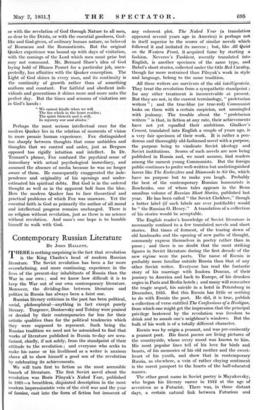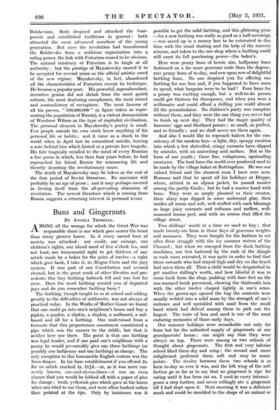Contemporary Russian Literature BY JOHN HALLETT. ,r HERE is nothing
surprising in the fact that revolution is the King Charles's head of modem Russian literature. The Soviet revolution has been a far more overwhelming, and more continuing, experience in the lives of the present-day inhabitants of Russia than the War in our own ; and we know how difficult it is to keep the War out of our own contemporary literature. Moreover, the dividing-line between literature and politics in Russia has always been a faint one.
Russian literary criticism in the past has been political, social, philosophical—anything in fact except purely literary. Turgenev, Dostoevsk3r and Tolstoy were praised or decried by their contemporaries far less for their artistic qualities than for the political tendencies which they were supposed to represent. Such being the Russian tradition we need not be astonished to find that works of literature published in Russia to-day are scru- tinized, chiefly, if not solely, from the standpoint of their attitude to the revolution ; and everyone who seeks to make his name or his livelihood as a writer is anxious above all to show himself a good son of the revolution by celebrating its achievements.
We will turn first to fiction as the most accessible branch of literature. The first Soviet novel about the revolution was Boris Pilnyak's Naked Year, published in 1921—a breathless, disjointed description in the most modern impressionistic vein of the civil war and the year of famine, cast into the form of fiction but innocent of any coherent plot. The Naked Year (a translation appeared several years ago in America) is perhaps not in itself superior to the scores of similar novels which followed it and imitated its success ; but, like All Quiet on the Western Front, it acquired fame by starting a fashion. Neverov's Tashkent, recently translated into English, is another specimen of the same type, and Babel's short stories, collected under the title Red Cavalry, though far more restrained than Pilnyak's work in style and language, belong to the same tradition.
All these writers are survivors of the old intelligentsia. They treat the revolution from a sympathetic standpoint ; for any other treatment is inconceivable at present. But they are not, in the current terminology, " proletarian writers " ; and the true-blue (or true-red) Communist looks on them with a certain suspicion, not unmingled with jealousy. The trouble about the "proletarian writers " is that, in fiction at any rate, their achievements have not yet equalled their ambitions. Gladkov's Cement, translated into English a couple of years ago, is a very fair specimen of their work. It is rather a pon- derous and thoroughly old-fashioned novel with a purpose, the purpose being to vindicate Soviet ideology and Soviet institutions. Scores of such novels are now being published in Russia and, we must assume, find readers among the earnest young Communists. But the foreign public continues to prefer well-written but undistinguished farces like The Embezzlers and Diamonds to Sit On, which have no purpose but to make you laugh. Probably the best of the contemporary Russian humourists is Zoschenko, one of whose tales appeals in the Bean omnibus volume of Russian Short Stories, published last year. He has been called "the Soviet Chekhov," though a better label (if such labels are ever justifiable) would be" the Russian 0. Henry." A translation of a collection of his stories would be acceptable.
The English reader's knowledge of Soviet literature is necessarily confined to a few translated novels and short stories. But times of ferment, of the tearing down of old landmarks and the opening of new paths of thought, commonly express themselves in poetry rather than in prose ; and there is no doubt that the most striking figures in Soviet literature during the first decade of the new regime were the poets. The name of Escnin is probably more familiar outside Russia than that of any other Soviet writer. Everyone has read the fantastic story of his marriage with Isadora Duncan, of their journey to America and back to Europe, of his drunken orgies in Paris and Berlin hotels ; and many will remember the tragic sequel, his suicide in a hotel in Petersburg in December, 1925. But this Esenin has little or nothing to do with Esenin the poet. He did, it is true, publish a collection of verse entitled The Confessions of a Hooligan, from which one might get the impression that the principal privilege bestowed by the revolution was freedom to drink and to smash one's neighbour's windows. But the bulk of his work is of a totally different character.
Esenin was by origin a peasant, and was pre-eminently a peasant poet. His finest poems are living pictures of the countryside, whose every mood was known to him. His most popular lines tell of his love for birds and beasts, of his memories of his old mother and the sweet- heart of his youth, and show that in contemporary Russia, as elsewhere, a vein of rather cloying sentiment is the surest passport to the hearts of the half-educated masses.
The other great name in Soviet poetry is Mayakovsky, who began his literary career in 1912 at the age of seventeen as a Futurist. There was, in those distant days, a certain natural link between Futurism and Bolshevism. Both despised and attacked the bour- geoisie and established traditions in general ; both attracted the most advanced members of the young generation. But once the revolution had transformed the Bolsheviks from a seditious organization into a ruling power, the link with Futurism ceased to be obvious. The natural tendency of Futurism is to laugh at all authority ; but the prestige of Mayakovsky caused it to be accepted for several years as the official artistic creed of the new regime. Mayakovsky, in fact, abandoned all the characteristics of Futurism except its technique.
• He became a popular poet. His powerful, superabundant, inventive genius did not shrink from the most garish colours, the most deafening cacophonies, the most mixed and contradictory of metaphors. The most famous of all his poems, " 150,000,000 " (a figure taken as repre- senting the population of Russia), is a violent denunciation of Woodrow Wilson as the type of capitalist civilisation. The personal element in Mayakovsky's poetry is small. Few people outside his own circle knew anything of his personal life or habits ; and it came as a shock to the world when in April last he committed suicide, leaving a note behind him which hinted at a private love tragedy. His fate tragically recalled to the mind of every Russian a fine poem in which, less than four years before, he had reproached his friend Esenin for renouncing life and thereby deserting the revolutionary cause.
The death of Mayakovsky may be taken as the end of the first period of Soviet literature. Its successor will probably be an age of prose ; and it may perhaps succeed in freeing itself from the all-pervading obsession of revolution. The newest literature which is coming from Russia suggests a returning interest in personal issues





































 Previous page
Previous page